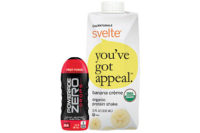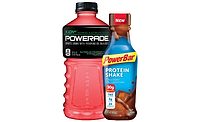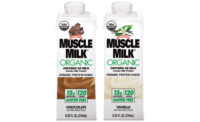Although sports drinks are commonly marketed for their hydration and workout recovery benefits, some consumers also are looking for low-calorie options, according to Chicago-based Mintel. “Diet sports drinks appeal to consumers who want the functional benefits of electrolytes without the calories of a traditional sports drink, which could impede those on a restricted-calorie diet,” Jennifer Zegler, beverage industry analyst for Mintel, said in Beverage Industry’s May issue.
According to Mintel’s September 2012 “Sports Drinks” report, diet sports drinks did not exist in large scale until 2009, but they have been responsible for the majority of growth in the sports drinks market since then. In fact, from 2010 to 2012, diet sports drinks took nearly 6 points of market share from regular sports drinks and are expected to lead category growth in the next few years, it reported.
Representing the success of the diet sports drinks segment of the market, Powerade Zero Ion4 came in the No. 5 spot on Chicago-based Information Resources Inc. (IRI)’s top non-aseptic sports drinks list with nearly $229 million in sales for the 52 weeks ending May 19, while Powerade Zero earned the No. 10 spot with nearly $54 million in sales in the same time period. Gatorade also offers a G2 low-calorie variety with 20 calories in each 8-ounce serving, which ranked No. 3 on IRI’s top non-aseptic sports drinks list with more than $486 million in sales, as well as a G2 Natural variety with 20 calories in each 8-ounce serving and natural ingredients including sea salt, fruit flavors and natural sweeteners, the company says.
Within the last year, hybrids and innovative products also have stepped into the category to offer similar benefits as sports and protein drinks to athletic consumers. For example, Mio, a liquid concentrate brand of Northfield, Ill.-based Kraft Foods Group Inc., launched Mio Fit during Super Bowl XLVII in February. The brand marketed the product in its commercial as “a sports drink with electrolytes you can flavor your way,” and urged consumers to change how they think about sports drinks.
In March, Xyience, a Las Vegas-based energy drink company, released a non-carbonated, caffeine-free beverage named Xyience Xenergy + Hydration. Although the brand has energy at its core, this new product combines the energy drink category with the sports drink category to offer a hydration option, Xyience President John Lennon told Beverage Industry in its May issue.
Protein drinks also are popular among general consumers as well as athletes for their flavors and convenience, said Chris Schmidt, U.S. consumer health analyst for Euromonitor, Chicago. According to Santa Monica, Calif.-based IBISWorld’s November 2011 report, “Meal Replace-ment Product Manufacturing in the US,” sales of RTD protein drinks are growing in popularity among time-crunched Americans who can use it as a quick meal replacement as well as consumers who are looking to improve their diets and lose weight.
Protein drinks still are important among athletes, too, Euromonitor’s Schmidt noted. “Protein has always been a very key ingredient for the hardcore-consumer-type in sports nutrition, and that’s something that’s really important to keep in mind,” he said. However, these hardcore consumers, like the body builders and strength trainers, tend to be more interested in the powder format than the RTD protein drinks, because the powders are more competitive in terms of price point and amount of protein, he said.
Nevertheless, RTD protein beverages rose 20 percent in 2012 and are expected to rise at about 8 percent a year during the next few years, Schmidt said.





